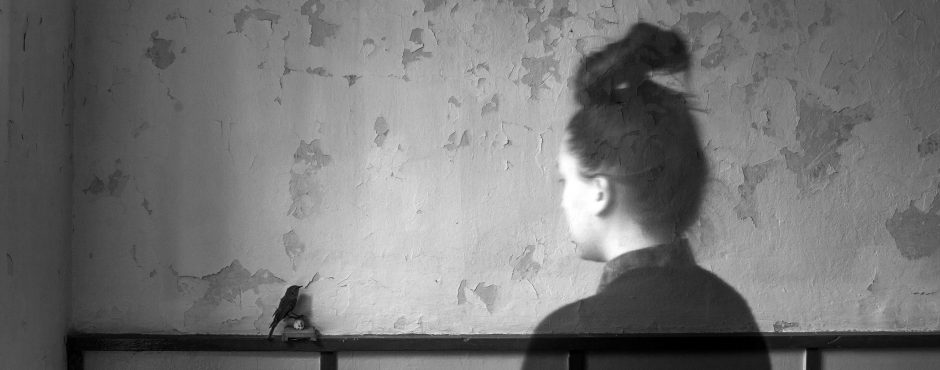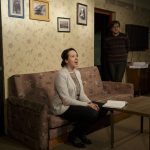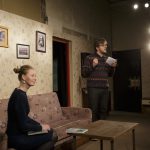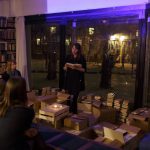THE FIRST TO LEAVE
Authors: Toms Auniņš, Austra Hauks, Joanna Kalm, Kārlis Krūmiņš, Epp Kubu, Kristina Norman, Karolin Poska, Valters Sīlis
With participation of Marija Bērziņa (National Theatre), youth choir “Balsis”, Alise Madara Bokaldere, Arina Buboviča, Laura Gorodko (Latvian Academy of Culture), Aksels Tomass Šelders, Marģers Vanags, Reinis Dāgs Zvirgzdiņš (LKA Latvian Culture College)
Light designer Jūlija Bondarenko
Producers: New Theatre Institute of Latvia, Kanuti Gildi SAAL
February 15 at 18.00
February 17 at 18.00
February 18 at 13.00 and 18.00
Eduarda Smiļģa Theatre museum Talsu iela 1
In Livonian, Estonian and Latvian
Duration: 1h50
Sold out
In the core of LATEST programme is a new creation “The First to Leave”. Starting from the first residency in Oleri last April, eight performing artists from Latvia and Estonia, have been looking for a common theme that would be interesting for the all involved and for the audiences in both countries. Even though the attitude towards Livonians is different in each country, this nation has played an important role in the context of statehood and different ideologies governing Latvia and Estonia. The fate of Livonians stands as a reminder about the impermanent nature of all things in the world and a warning that disappearance of a small nation can be quick and imminent. The performance takes a closer look at the role of each country’s politics in the life of Livonians and what does it mean to be a Livonian today? Eventually, it asks a question: Is the disappearance really a tragedy? The authors of “The First to Leave” are composer Toms Auniņš, set designers Austra Hauks and Epp Kubu, choreographers Joanna Kalm and Karolin Poska, visual and video artist Kristina Norman, dramaturg, director and performer Kārlis Krūmiņš and director Valters Sīlis.
“I think this piece will not be so much about Livonians as about the different perspectives on the Livonian topic. When Latvia and Estonia were newly established states, they had different ideological grounds. For Latvia it was important to find a way to unify the nation because of the different languages spoken on the Latvian territory and Livonians were regarded as a marginal group in this process. While for the Estonian state it was important to search for roots in the larger Finno-Ugric culture where Livonians also belonged. Their dissolving into Latvian culture was perceived by Estonians as a tragedy. Many culture activists and folklorists, and also politicians raised the agenda to save the Livonians from disappearing. This did not go well with the Latvian grand narrative. There was a conflict around Oskar Loorits, the most outstanding Estonian folklorist and researcher of the Livonian culture. He collected and compiled the “Bible” of the Livonian folk songs „Volkslieder der Liven”. Allegedly, this collection contained all songs known to Livonians. One of these songs, and this is the most ancient Livonian song, “Tšītšōrlinkizt”, will re-occur during the piece.” Kristina Norman
“One of the issues in this piece is about the way in which a majority exercises power over minority and tries to make it non-existing. A problem that concerns a small number of people can be ignored because it concerns only 0.5% of the population… Latvian writer Aleksandrs Grīns wrote about how unprofitable the Livonians were and how their existence did not pay off. But in a global context the Latvians don’t pay off either! Just try to compare the profit a book written in Russian would make over one written in Latvian. The argument about profitability that could be used by a giant nation, was used by Latvians against Livonians!” Valters Sīlis
“It is fascinating how people fight for their right to exist, how it is cut off in different ways and what eventually remains. It’s not like everything disappears. There is no absolute end. Rather it takes a different shape. Nobody personally loses the culture. You might feel very lonely with your culture, but that is something different.” Kārlis Krūmiņš
“It is not only about Livonians. We want to pay attention to everything that is dying out. My fried who lives on a small island in Australia, posted a message on Facebook about five species of birds that had died out there. Now they have rats everywhere. I want to think about how everything is changing – somebody dies and somebody else is taking the place. It’s a part of the nature, it’s a natural cycle.” Epp Kubu
Thanks to Valts Ernštreits, Ēriks Kāpbergs, Zoja Sīle, Helmī Stalte, Julgī Stalte, Dāvis Stalts, Ulla Fraser, Baiba Šuvcāne, Rita Treija, Ieva and Kārlis Zemīši from Oleru muiža, Sirje and Sepideh Ardalani from Massia, Olita Kalna, Meelis Muhu, Maima Grīnberga, Valters Ščerbinskis, Jaak Prozes, Ineta Sipunova, Andrejs Strokins, Latvian State Historical Archives, Latvian Academy of Culture National Film school, Jānis Liniņš, Kārlis Lapiņš, Katrīna Dūka, Jānis Laucenieks, Aleksis Aleksis, Mārtiņš Jēkabsons, Kristīne Ķikute-Krievkalna, Marta Lortkipanidze and to everyone who donated books
Back













